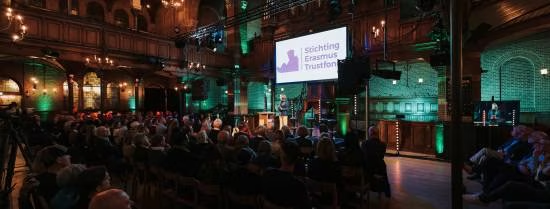Climate change, inclusion, nitrogen: these are topics on which just about everyone has the most diverse perspectives. How can we still address each other, in these times of increasing polarization and declining trust? Professor Ronald van Raak answers this question in the 19th Rotterdamlezing by going back to the works of our namesake: Desiderius Erasmus. "Who shows that you can discuss anything with each other. As long as you do it with humor and irony and with healthy self-relativization."
“We see it in Rotterdam and we see it everywhere else: people are afraid that contradictions will increase and they want to look for that which really binds us… but aren't we all stubborn individuals who don't let the moral rules dictate to us?”, starts Ronald van Raak, professor of Erasmian Values at the Erasmus School of Philosophy (ESPhil), in Arminius Church. “That may be: but let's also turn it around. Isn't the reverse equally true? Because all those opinion polls, by SCP or EUR, also show a need for a sense of community. That we belong to something and are part of something.”

See the world through the eyes of a fool
Erasmus teaches us to look with an abstract perspective, with the gaze of folly: “After all, the world is foolish, and therefore looking through the glasses of folly is the only way to better understand people. It is actually very simple: if you turn your gaze and look from a different perspective, the world looks different.” Van Raak emphasizes that Erasmus also lived in very polarized times, where you could literally lose your head.
He addresses a discussion that is taking place at many universities about the need for a safe space. “At the university, the discussion is broadly as follows: during lectures, or on campus, a number of people seem not to want to be confronted with words or thoughts that could hurt them. Another group of people have the opposite opinion: they believe that anything should always be said at a university.”
Outspoken versus nuanced views
"In public discussions, this does happen: that outspoken views dominate the debate and many people don't feel comfortable with one thought or another." This is evident in Van Raak's experiment: when he asks the audience who thinks no one should ever be hurt, a few raise their hands; when he then asks who thinks everything can be said, even if it results in hate speech, all hands remain down. The audience is most comfortable with the third option: not one extreme or the other, but a more nuanced position that falls in between.
''I have seen that you cannot demand respect, but have to earn it, by allowing others their worth''
“People at our university I ask about it also seem to have a completely different idea of a safe space. Not a place where you can hardly say anything – nor where you should be able to do anything just like that. But above all a space where you can try and experiment and a place to emancipate yourself”, says Van Raak.

With humor and irony, you can discuss anything
How does the university ensure that open discussions are possible again in education, asks a concerned former student in the audience. Rector magnificus Annelien Bredenoord answers her question by talking about the new ‘Educational Vision’. This stipulates that education on campus is the standard for the EUR, so that everyone will again physically sit together in a lecture hall. In addition, the aim is to implement an impact course for everyone in the third year of the bachelor's degree in order to make the link with society.
Erasmus, however, shows that you can discuss anything with each other, Ronald van Raak concludes his Rotterdamlezing. "As long as you do it with humor and irony and with healthy self-deprecation. You are willing to empathize with another person, through which you also get to know yourself better. And see what values you share and what binds us as people. What I learned from Erasmus is that freedom begins with granting freedom to others. Because you cannot be free alone. I have seen that you cannot demand respect, but have to earn it, by allowing others their worth. Because living together you do not do alone and always hand in hand."
The Rotterdamlezing is an annual gift from Erasmus University Rotterdam and the Erasmus Trust Fund to the city of Rotterdam. This was the 19th edition.
Watch the Rotterdamlezing 2023 in full here

Or watch the highlights of the Rotterdamlezing 2023 here

Get an impression of the 19th Rotterdamlezing

- Related content
- Related links
- What can we learn from Erasmus of Rotterdam today?
De les van Erasmus: vrolijk polariseren en nooit cancelen




